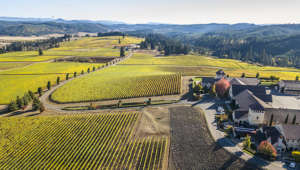Meliton Martinez arrived at King Estate in 1993 at age 19 when the winery was still under construction. Leaving his home and family in rural Mexico, Mel, like so many before him, came to the U.S. looking for opportunity and willing to take a chance. “I was fortunate that I came here,” he recalls. “This was my first job ever. I came here looking for work and sure enough I found lots of it.”
Intending to work a year and then return home, he stayed. Today, Mel is King Estate’s longtime Vineyard Manager and the Lorane Valley is home to him, his wife, two children, 27 sheep and countless chickens and ducks tended by his 14-year-old daughter, Victoria. For almost two decades he has lived on 4.5 acres on the estate, where he can keep a close eye on the property he manages.
As Vineyard Manager, Mel oversees 467 acres of grapes, a crew of 10 and as many as 200 workers during harvest. “I like learning and when I came here I understood that if I wanted to excel I needed to learn the language and the vineyard,” he recalls. Mel had no experience with wine, although his family in Mexico had a small farm and grew corn and beans as well as maguey, a plant from the agave family used to make a traditional drink called pulque.
He began by asking questions. “I didn’t know anything about growing grapevines,” he says. “I read a lot of books, learned the language through talking, practicing and the dictionary.” He took classes at Chemeketa and Lane community colleges, got hands-on experience, and took advantage of opportunities that came his way from early mentors including Co-Founder Ed King, Jr.
Mel is part of a leadership team that works closely together, from field to fermentation, to produce King Estate’s premium wines. “There is a spirit of mutual respect among co-workers here,” he notes.

Managing a property the size of King Estate a big task, Mel acknowledges, “but with the help of dedicated people it makes it so much easier. Everybody gets so good at what they do that they require minimal supervision.” It helps that Mel has done virtually every job that he now oversees. “Not the tractor work, but the labor part, I’ve done all of it. I understand that it’s heavy work, hard work, working outside in the winter and in the heat.”
Working outside is something Mel has long enjoyed and working for a winery has piqued his interest in wine. These days he dabbles in winemaking and recently made a barrel each of Pinot Noir and Pinot Gris. Lately his interests have expanded to writing short poems and songs, including one, “El Norte,” that a band recorded in August.
After all these years, not surprisingly, Mel knows every inch of the vineyard. Most of the soil is beautiful silty clay loam, he says, except some land that remains unplanted because it’s too cold with too much clay that retains too much water during the rainy season.
He gazes out at the vineyard that is turning from green to gold, backed by stands of Douglas fir. “Look at those beautiful hills,” he says as if seeing them for the first time. “I’m amazed how vines survive without irrigation. I’m amazed how vines send roots out to get nutrients and water. I try to enjoy every part of the day. I’ve been trying to find beauty in every part of the season.”
It’s time for our interview to wrap up. Any last thoughts? Just one:
“It feels like home.”
